817 Search Results for praactical teaching
January 27, 2014
by Robin Parker -
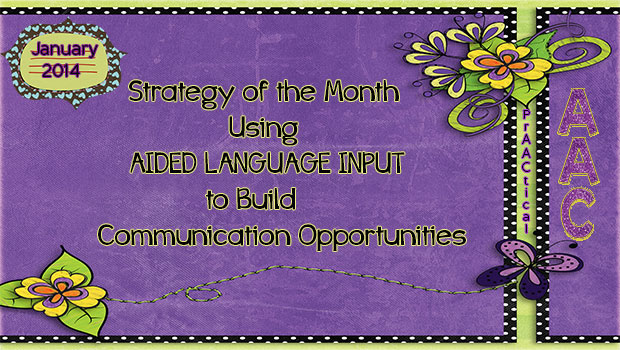
We can not write, speak or do enough Aided Language Input (ALI). If we expect learners to speak AAC, we must speak AAC to them. It is difficult enough to learn a language and imagine if no one spoke it to you in the language you were expected to speak…But there are so many more reasons to do ALI. Aided Language Input (ALI) belongs in the context of communication opportunities. It is modeling AAC style. Once we model a target language concept AAC style, then add the wait and signal strategy, the learner then knows it is their communicative turn. Especially if you wait with the raised eye brow signal. They often will take their turn expressively. But, if they do not take the communicative opportunity to take their turn, there are gestural, visual, verbal, and physical prompts that can be implemented. In other words, they can make use of... [Read More...]
January 16, 2014
by Robin Parker -
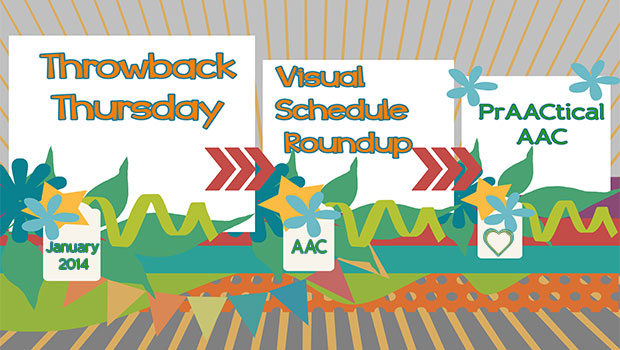
As times goes on in the academic year, we often think that everyone knows their schedules. But remember, knowing and seeing are two completely different things. For this Throwback Thursday, we wanted to go over visual schedules of all types to remind ourselves not to back off with schedules (all types) even if it seems everyone is transitioning well and knows their schedules. We wouldn’t want anyone to take away our day planner…. even when we knew our schedule. What’s the Connection- Core Words & Schedules Visual Schedules 411 Get Organized for the New Year: 5 Visual Schedule Apps Schedule Changes A Myth About Visual Schedules A PrAACtical Myth Lives On.. Again Visual Schedule Myths Live On and On… Power of the Visual Planner Schedules and Choices Riddle Me This AAC at Home: Visual Schedules and Supports Building Complex Schedules Ideas for Teaching the Use of Schedules PrAACtical Mini-Schedules Video... [Read More...]
January 14, 2014
by Carole Zangari -
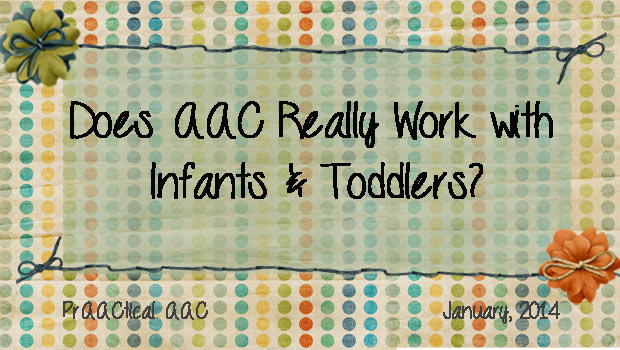
We are occasionally asked how old children have to be before you can begin teaching AAC. Our answer: There is no set minimum age. Nor is there any research evidence that one has to use an oral-language only approach for a set period of time before beginning AAC. Today, we’re delighted to be able to share an article on this topic with you. This article describes a research review in which Branson and Demchak identified a dozen research studies looking specifically at the use of various AAC tools and strategies with infants and toddlers. Data from 190 children up to 36 months of age were examined. Of the 12 studies reviewed, 7 met criteria for having conclusive findings. In 97% of all cases, the children’s communication skills improved. Looking only at the 7 most rigorous studies is even more encouraging: All 135 babies/toddlers demonstrated improved communication skills following AAC intervention.... [Read More...]
January 10, 2014
by Robin Parker -

STRATEGY OF THE MONTH Supporting Pre-Intentional Communicators Breaking Through with Pre-Intentional & Beginning Communicators of ALL Ages Helping Pre-Intentional Communicators to Cross the Intentionality Bridge More Ideas for Supporting Pre-Intentional Communicators PRAACTICAL THINKING PrAActical Nominations: The 2013 Edublog Awards I was Thinking About Buying an AAC App- Now What? 5 Ways to Encourage AAC Learners 30 P0sts You May Have Missed in November How Much Time Do SLP’s In Healthcare Settings Spend on AAC Services to Children AAC Goes to the Eddies Does AAC Benefit Children with Profound and Multiple Disabilities Throwback Thursday: Talk About Me 2 3 Responses to Programs that Make Kids ‘Prove Worthiness’ Prior ro Providing Access to AAC AAC Vocabulary Lists Throwback Thursday- Past Posts About Pre-Intentional and Beginning Communicators Power Words from PrAACtical Friends A PrAACtical Christmas Carol 8 Ways to Have an AAC Holiday Season A PrAACtical Christmas AACtual Therapy with Shareka Bentham- Started from... [Read More...]
January 2, 2014
by Carole Zangari -
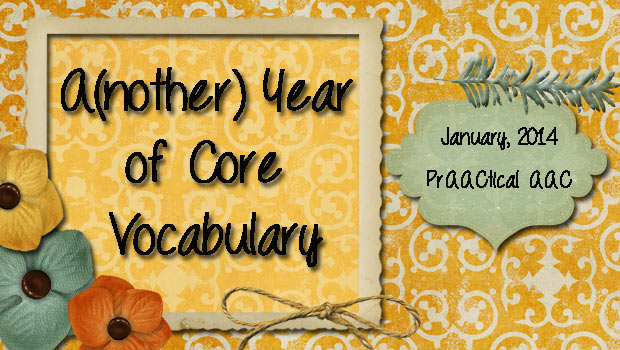
It hardly seems possible that a year has gone by since we posted a Year of Core Words 2013. We’ve been so gratified by the feedback from professionals and parents who’ve put it to good use and followed month-by-month to focus on a dozen core words and get suggestions for additional practice. We were thrilled when others added symbols, created teaching materials, and adapted it for their own use. Today we’re back with the 2nd Year of Core Words, this time with 16 words/month. If you follow along, you’ll have covered 192 new core words by the end. Once again, we created 12 grids of core vocabulary words – one for each month of the year. Each grid has 16 cells labeled with core words. Plug in the AAC symbols that your client uses (e.g., PCS, SmartySymbols, Unity, Pixons, etc.), print, laminate, and keep them handy. Feel free to adapt... [Read More...]
December 27, 2013
by Carole Zangari -

It’s been a wonderfully prAACtical year. Here’s a look back at our top 10 most popular posts. Anyone see any patterns? 🙂 How I Do It: Writing IEP Goals for Students Who Use AAC by Lauren Enders Teaching Core Vocabulary 5 Great Resources for Pre-Made Communication Boards Core Samples A Year Of Core Vocabulary Words AAC ‘Must Haves’ the the Classroom and Therapy Room Pivotal Skills for AAC Intervention: Aided Language Input How I Do It: AAC in the IEP by Lauren Enders Getting Started with Core Vocabulary More on Teaching Core Vocabulary
December 26, 2013
by Carole Zangari -
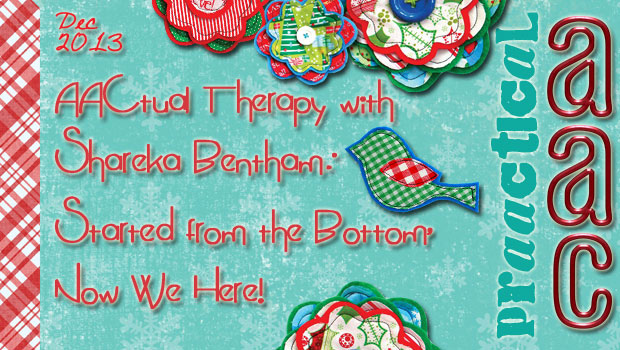
We’re so thrilled to have Shareka Bentham back as an AACtual Therapist, this time talking about her journey into high tech AAC. You can see other posts from Shareka here. One of our colleagues completed the AAC evaluation on a client of Shareka’s. While preparations for that evaluation were underway, we were fortunate enough to learn of an AAC device that was no longer needed. The family agreed to donate it to this little fellow, and that seems to have launched a whole chain of prAACtical events. Shareka takes it from here… Sadly, this is not the first step into my career as a rapping superstar, but more a description of my journey from ‘no tech’ to high tech in AAC use. If someone had told me a year ago that I would be showing off my skills on a high tech AAC device, and teaching children, parents, and teachers... [Read More...]
December 24, 2013
by Robin Parker -

Use social narratives to explain happy upcoming events, stressful upcoming events, and out of the routine type events. Not only do social narratives help with understanding, but they can also help with ways to talk about activities and events. Use Aided Language Input (ALI) to model. It will show that even when there is a lot going on, AAC is still important and a high priority. Give out some AAC related presents to educators, professionals, families, and AAC users. Create the visual supports for holiday songs and poems. Or use a single step or sequential message device to record the songs, so everyone can sing together. You can even program the songs into high tech devices and have quite the good singing voice. Provide frequent communication opportunities for the AAC user to make choices, give opinions, rate activities and events, vent, ask questions, tell, and share information. Make talking photo... [Read More...]
December 22, 2013
by Robin Parker -

Awesome video from Kreed’s World on teaching short conversations. Look at the great example of the language facilitation strategy: repetition with variety. Also, look at the meaningful language experience for Kreed (and his communication partner) as the conversation was authentic and based on Kreed’s interest.
December 19, 2013
by Robin Parker -
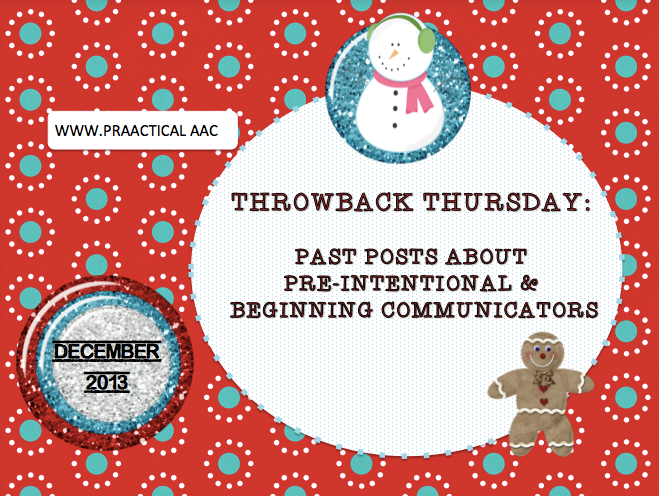
The Strategy of the Month for December is about Pre-Intentional and Beginning Communication. We knew this topic meant a lot to us because these learners are often overlooked or given up on just when they need help the most. We didn’t realize how important it was to us, until we started ’rounding up’ our past posts and found so many. We are fortunate to have worked with many pre-intentional and beginning communicators because they often teach us the most, and we love learning. Presuming Competence 3 Responses to Programs that Make Kids “Prove Worthiness” Prior to Providing Access to AAC Does AAC Benefit Individuals with Profound & Multiple Disabilities Strategy of the Month Strategy of the Month: Supporting Pre-Intentional Communicators Breaking Through with Pre-Intentional & Beginning Communicators of All Ages Supporting Pre-Intentional Communicators Teaching Basic Requests Making it Work: The PrAACtical Side of Therapy to Teach Requests Literacy Lessons for... [Read More...]









